‘He’s never forgotten his roots’: How Justin Longmuir took footy of Koorda to the top job of AFL coaching
Justin Longmuir’s rise from a shy country kid to an AFL star to a 99-game coach could forget where he came from. But as ELIZA REILLY found as she visited his home town of Koorda, the Longmuir name runs deep in the WA wheatbelt.
They say it takes a village to raise a child.
But in Justin Longmuir’s case, it took a football club to rear a senior coach.
Longmuir’s journey from shy country kid to the top of the AFL is one that is unlikely to be repeated anytime soon. But the principles, work ethic and casual persona that have underpinned Longmuir’s first 99 games as coach of Fremantle were all forged in Western Australia’s Wheatbelt.
It all started in the small town of Koorda, a three-hour drive from Perth.
Like any country town, there’s a pub. There’s a train station. There’s an IGA. And there’s a footy club.
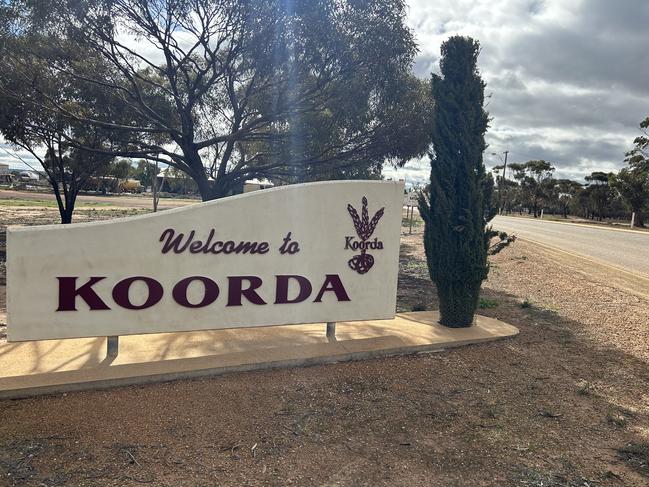
Around 400 people live in the city centre, ‘townies’ they call them, and Koorda’s surrounding 9.6-kilometre square shire. If you’re not on a farm, you probably work at one, with wheat, other cereal crops and sheep the main lifeblood of the community.
But on Saturdays, the whole town flocks to the football club.
“Country football is one big family,” Kangaroos life member Gary Greaves said. “This is our life.”
The AFL seemed like a world away back then. But Longmuir was always destined to play for Koorda.
The family lived on a farm 45km out of town. They sold it a few years ago but it once belonged to Ian and Steph Longmuir.
Together, they bred sheep and raised their young family, starting with older brother Troy followed by Justin and then younger sister Carly.
Longmuir’s junior teammate Josh Smith grew up on a neighbouring farm. The pair went to primary school together, agricultural college in Cunderdin and they were at each other’s weddings.
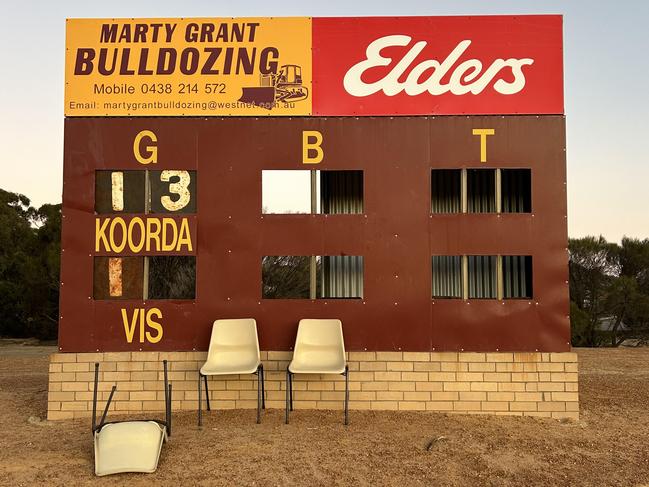
But despite being a year older, and wiser according to Smith, the Longmuir’s poached all the football talent in Koorda.
“We visited each other all the time and did what farm kids do…helping dad, chasing sheep, driving utes around from a pretty young age,” Smith said. “There was always footy, basketball, cricket, something to be played at their farm.
“I always wonder why they got all of the footballing ability and I didn’t get any. They took more than their fair share.”
It helped that the family farm became a pseudo-football club.
Ian is a Koorda legend. He’s a life member, former captain and senior coach.
He’s also the games record holder at the football club with 339 and a premiership to his name, the Kangaroos 1984 triumph which the club is hosting a 40-year reunion for on Saturday. One eye will undoubtedly be on the TV as Fremantle hosts Richmond at Optus Stadium, Longmuir’s milestone match.
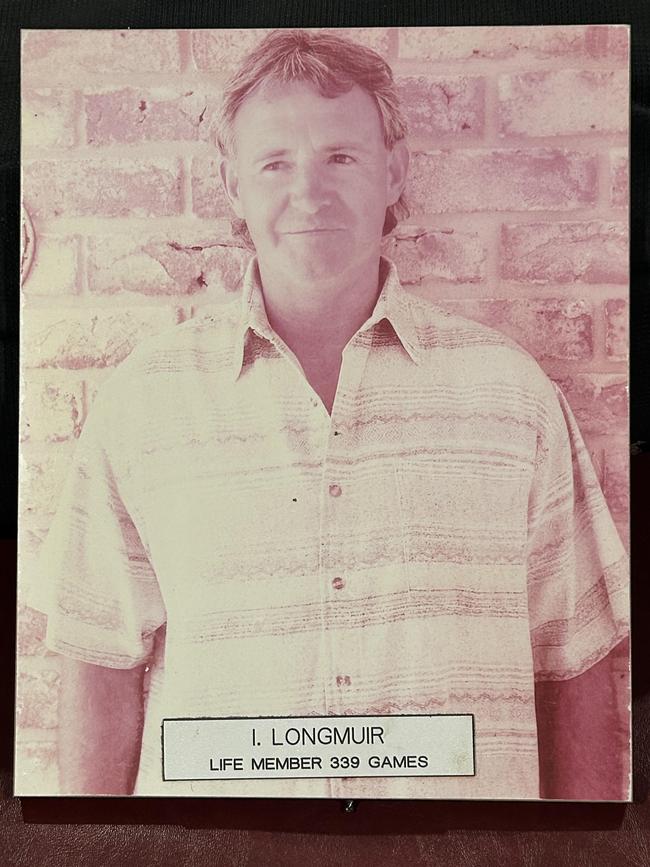
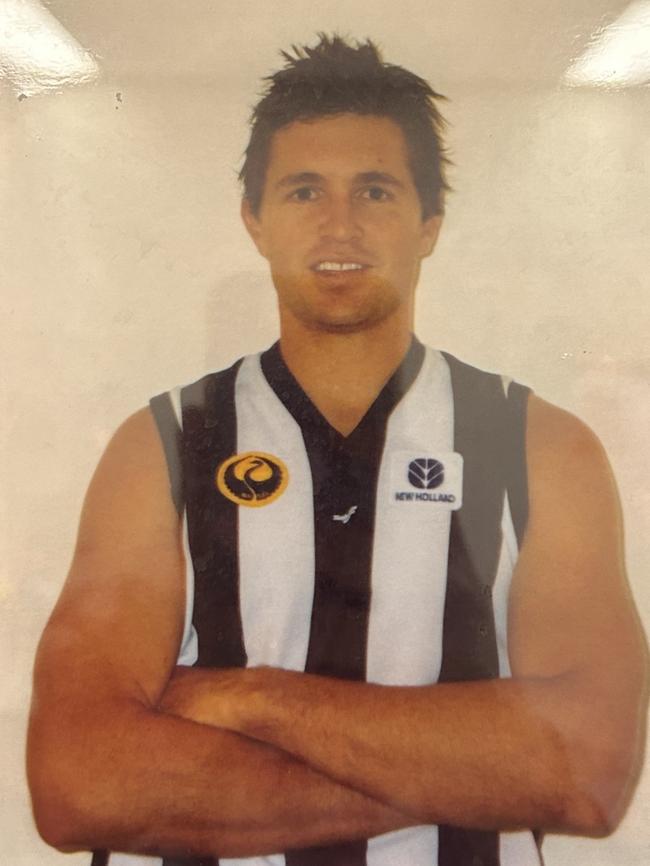
“Their father can take a lot of credit,” Greaves, a family friend of the Longmuir’s said. “He spent hours putting up goal posts, point posts out on the farm for them.
“They must’ve played I don’t know how many hours of football as kids with their father.”
When the locals talk about Justin, they can’t not mention Troy.
“They were thick as thieves together,” Greaves said. “You couldn’t separate one from the other.”
The eldest of the three, Troy was the most passionate about football. That’s not to say that Justin wasn’t. But it was absolutely no surprise to those at the Kangaroos that Troy was drafted in 1997 to Melbourne, playing 83 games in total across his time at the Demons, Dockers and Blues.
The perpetual junior best and fairest trophy at Koorda is named after Troy. And having watched both run around from an early age, Greaves said it was clear which brother was more invested.
“Troy had the drive to be an AFL footballer,” Greaves said. “He had the talent.
“He dreamt football. He wanted it.
“Justin however was naturally talented. He did work hard but his attitude seemed to be more along the lines of ‘if it happens, it happens.’ I think seeing Troy get picked up sparked him a bit.”
Added Smith: “He loved his sport but I wouldn’t say that he was born with a footy in his hand.
“There were always other things to do as well. Troy was the mad, keen footy player.”
As soon as the pair were old enough, they signed up to play footy at Koorda. There were two divisions back then, junior and sub-junior.
“Longy was a small kid, believe it or not,” Greaves said. “He wasn’t this big, tall kid in his junior days.
“He certainly had a growth spurt from 12 or 13 onwards and developed into the big fella he is today.”
Longmuir was good although not necessarily a superstar. But those formative years were when he got his first look at coaching.
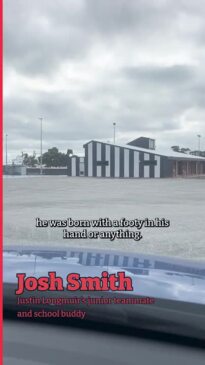
Greaves coached one junior division and Ian coached the other, meaning that Justin and Troy spent at least a few years under their dad’s tutelage.
“They were always pretty keen to watch their dad and they got a fair bit of footy knowledge and coaching from their dad,” Smith said. “If your dad is a dedicated, successful footballer well then you want to be like your dad.”
During the week, the kids went to school in Gabbin, a 20-minute commute from Koorda.
Smith’s mum was the teacher’s aide. Longmuir’s lent a hand in the office and did a bit of gardening as well.
In year seven, Justin was the only kid in his grade. He was also the only boy in years 5, 6 and 7. By the time he finished up, there were less than 20 students enrolled.
“There’s basically only two classes, the younger kids and the older kids,” Smith said. “You learn pretty quickly in that sort of environment.”
Longmuir didn’t love school. He loved football and farming.
After a short stint boarding in Perth at Swanleigh to attend Governor Stirling Senior High School, Longmuir enrolled at the Western Australian College of Agriculture in Cunderdin, an hour south of Koorda.
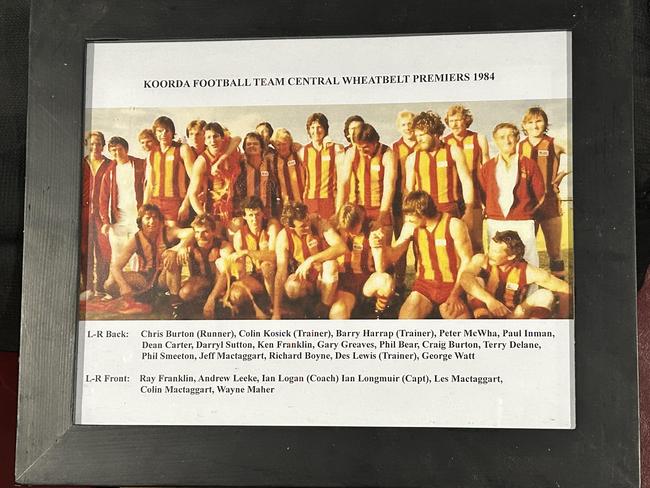
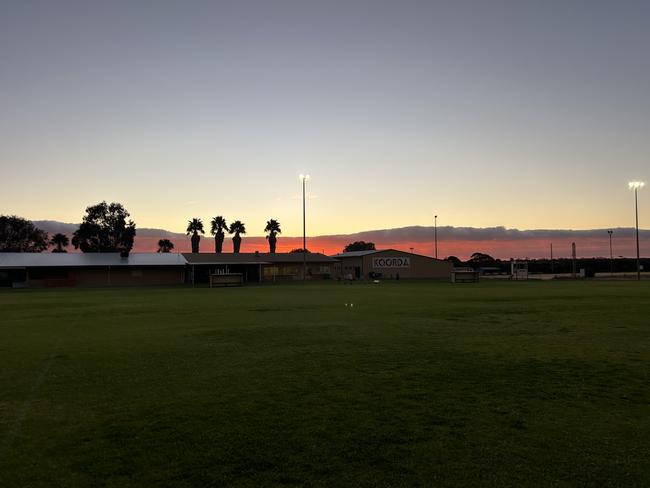
It was there that he got his first taste of senior football.
“Our first port of call was to welcome all the boys into town and let them know that there’s a footy club that they can play for while they’re studying instead of travelling home every weekend,” then Cunderdin captain Shane Darmody said. “Each country town can struggle for numbers a bit so some of them go home.
“We were pretty lucky that Longy decided to stay.”
Longmuir was already on West Perth’s radar by that point but it didn’t take an expert to appreciate his obvious talent.
“You were good if you started playing league football as a 17-year-old,” former Cunderdin teammate and president Ash Teakle said. “You were exceptional if you did it at 16. Especially country football.”
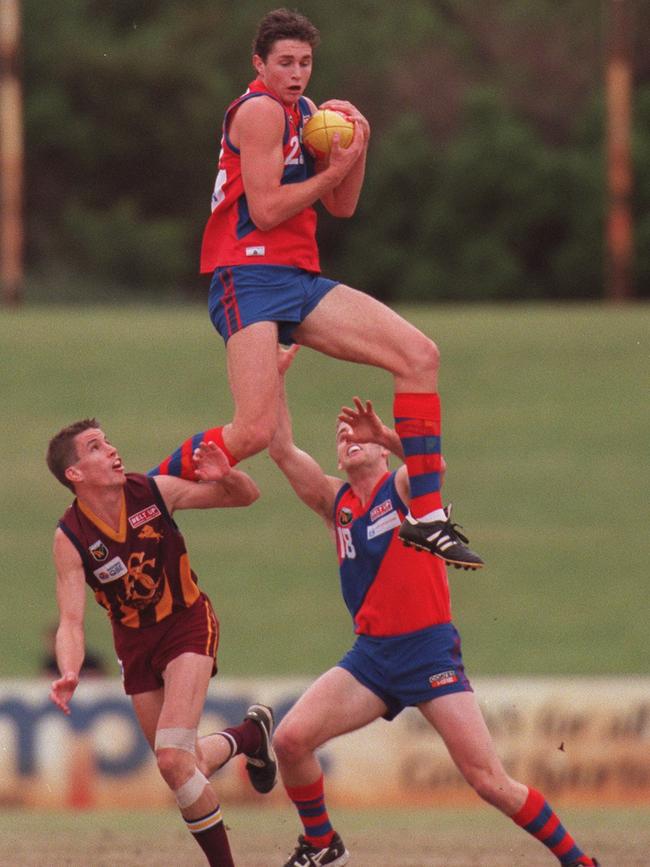
The coaches back then didn’t hesitate. If you were ready for senior football, you played senior football.
“Cunderdin obviously saw something in him and took a chance on him,” Teakle said. “Normally the physical element of senior football would preclude younger guys from playing at that age.
“It wasn’t unheard of but it was unusual. He was tall. He was mobile. And his skills were really good.”
Longmuir debuted for the Magpies in 1997. He needed a few games to find his feet but soon enough he started owning his spot in attack, even spending some time in the ruck.
There were definitely glimpses of promise. But nobody was confident enough to predict what he eventually might become. That was until a day in the wet against York.
“We won by 20 plus goals and Justin kicked seven goals from half-forward,” Teakle said. “For a young, tall, skinny kid to have skills like that in the wet…I haven’t forgotten it in the 27-odd years since.
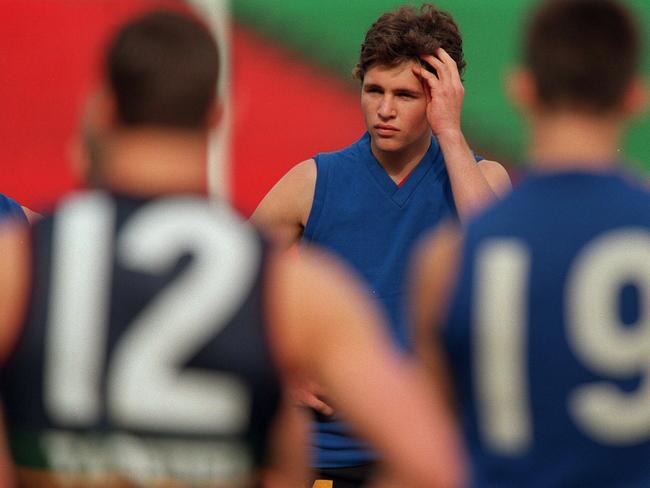
“At first, we weren’t thinking AFL or anything like that. But when we became aware that West Perth was chasing him, combined with what he was doing as a teenager playing senior football, it became pretty clear we wouldn’t be seeing him for very long in our colours.”
Records are a little scratchy but it’s thought that Longmuir played less than 15 games for Cunderdin. He didn’t play at all in 1998, his final year of college, due to Colts and State 18s commitments.
But Longmuir still made his mark at the Magpies.
“Even though he was from Koorda, he became a surrogate local,” Darmody said. “All the Ag school boys do.
“You always follow their path. It was really exciting for us when he got picked up, to have played a small part in his journey.
“I was playing as a key forward at the time as well and we were able to feed off his talent. It was really fun to play with a young bloke of that ability.”
So how did a shy boy from the Wheatbelt wind up an AFL senior coach?
It started when Fremantle drafted Longmuir at pick No.2 in the 1998 national draft after a breakout season at West Perth.
“It’s unprecedented,” Greaves said. “To go basically straight from country football to the AFL without playing any senior WAFL football, it wouldn’t happen today.”
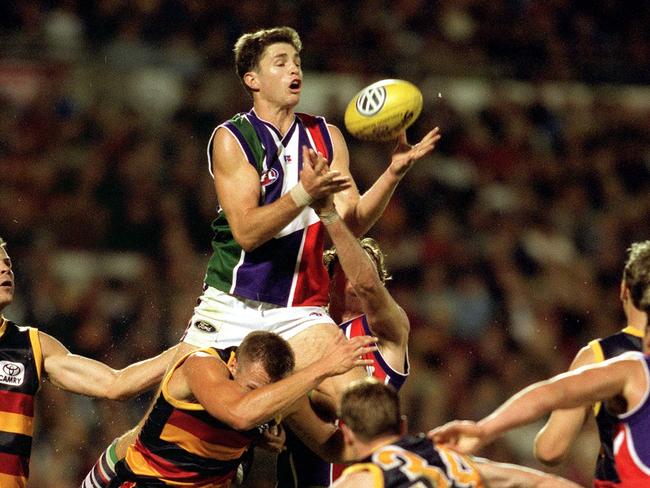
He played 139 games for the Dockers, none more memorable than his after-the-siren goal to snatch victory from St Kilda in 2005.
“That is the only time I’ve ever seen Justin burst out of himself and celebrate,” Greaves reckons.
Longmuir was forced to retire at 26 due to a degenerative knee injury but Fremantle kept him on as a recruiter, many crediting him for the Dockers’ decision to select Nat Fyfe at pick 20 in 2009. You might have heard of him.
In 2010, he coached West Perth’s midfield under Bill Monaghan. In 2011, he joined West Coast and was nurtured by the late Phil Walsh. In 2017, Nathan Buckley invited him to be an assistant coach at Collingwood.
And in 2019, he was appointed senior coach of the Fremantle Football Club, a homecoming 12 years in the making.
With the benefit of hindsight, were there the makings of an AFL head coach back then?
Greaves reckons that Longmuir’s rare public spray about players chasing stats in the aftermath of Fremantle’s loss to the Western Bulldogs was symbolic of his approach to football.
“He’s very much a team player,” he said. “He’s never been an individual.
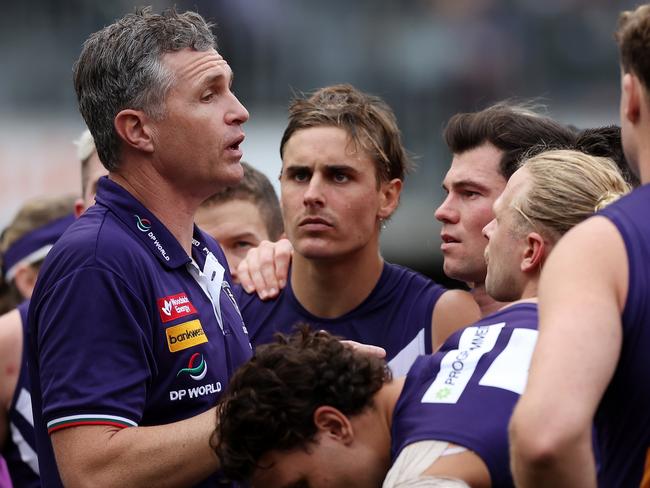
“Justin didn’t need to have five bounces down the field and kick a goal. He’d rather have one bounce, handball, go and block and let someone else kick the ball. He wasn’t a glory hunter.
“He’s methodical. All through his playing days and now into his coaching. He thinks about everything.
“People could see what we could see but it was so hard to believe because he was so laid-back about everything.
“I just hope one day that he gets to pick up that piece of silverware because if anyone deserves it, it would be him.
“We can only hope that one day he’ll come back and coach Koorda. We might have to look at the pay packet though.”
If Longmuir hadn’t made a fist of his playing career, Smith thinks that he would’ve been lost to football entirely.
“Without taking anything away from him, he was always pretty casual and never super serious about his footy or anything,” Smith said. “He was as he got a bit older.
“Even at Ag school, I reckon part of him saw himself coming back home and farming.”
Others saw a down-to-earth kid who was happiest around his friends and family.
“He was just a good kid,” Darmody said. “He’d listen. He’d take in what you said. He never had an ego or anything.
“He’s the exact same now. You can see that he’s generally quite level. He keeps his emotions in check, maybe not on the inside. He was a kid you wanted to play footy with.
“Looking back now, you can see that coaching was a path he could’ve and ended up taking because of the nature of his personality.
“He’s still a country boy at heart. He’s never forgotten his roots.”
From passionate player to 100-game coach 💜
— Fremantle Dockers (@freodockers) July 3, 2024
JL will crack the ton this Saturday night as he takes the reins for the 100th time as our senior coach!#foreverfreopic.twitter.com/zFhfdzhZae
From Koorda to Cunderdin, Perth, Melbourne and back again, Longmuir can’t pinpoint the exact moment that he decided he wanted to be an AFL head coach. But once he did, he knew it had to be at Fremantle.
“It’s not really something I set myself out to do, even play AFL,” the modest boss said this week, reflecting on his journey from Koorda to senior coach. “100 games as a senior coach is not really a milestone that I’ve looked forward to or aimed for.
“It’s been an interesting journey and one that I don’t take for granted and one that I’m really grateful to the football club for giving me opportunities first as a player and as an assistant or a development coach and now as a senior coach.
“I’m really grateful for what this club has given me and I work every day to try and give something back. I’ll be forever indebted.
“When I went into coaching I always aspired to be a senior coach. (Firstly) I wanted to be a good assistant coach and be well-rounded and take every opportunity that came my way and make sure that I was well-prepared if an opportunity came up.
“Fortunately this job became available. I always wanted to be a senior coach but I always wanted to be a senior coach here as well, deep down.”





